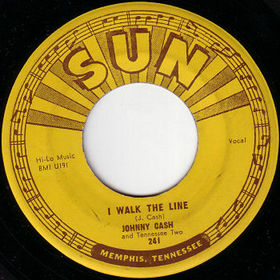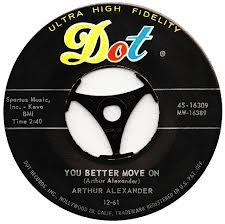
"Folsom Prison Blues" is a song by American singer-songwriter Johnny Cash. Written in 1953, it was first recorded and released as a single in 1955, and later included on his debut studio album Johnny Cash with His Hot and Blue Guitar! (1957), as the album's eleventh track. Borrowing liberally from Gordon Jenkins' 1953 song, "Crescent City Blues", the song combines elements from two popular folk styles, the train song and the prison song, both of which Cash continued to use for the rest of his career. It was one of Cash's signature songs. Additionally, this recording was included on the compilation album All Aboard the Blue Train (1962). In June 2014, Rolling Stone ranked it No. 51 on its list of the 100 greatest country songs of all time.
"(Ghost) Riders in the Sky: A Cowboy Legend" is a cowboy-styled country/western song written in 1948 by American songwriter, film and television actor Stan Jones.

"I Walk the Line" is a song written and recorded in 1956 by Johnny Cash. After three attempts with moderate chart ratings, it became Cash's first #1 hit on the Billboard charts, eventually reaching #17 on the US pop charts.

The Essential Johnny Cash is a double-compact disc compilation by Johnny Cash released as part of Sony BMG's Essential series. It was compiled to commemorate Cash's 70th birthday. It is not to be confused with the three-CD box set of the same name released by Columbia Records in 1992.
"Sunday Mornin' Comin' Down" is a song written by Kris Kristofferson that was recorded in 1969 by Ray Stevens before becoming a No.1 hit on the Billboard US Country chart for Johnny Cash.

"Ring of Fire" is a song made popular by Johnny Cash when it appeared on his 1963 album Ring of Fire: The Best of Johnny Cash. Written by Cash's eventual second wife, June Carter Cash, and Merle Kilgore, it was originally recorded as "(Love's) Ring of Fire" by June's sister, Anita Carter, on her 1963 album Folk Songs Old and New.

The Legend of Johnny Cash is a single-disc compilation album of American musician and singer Johnny Cash's career. It is the first such album to contain material from Cash's American Recordings era in addition to songs from his time at Sun and Columbia, as well as one track recorded for Island Records. It was released on October 25, 2005, on the Island/American/Columbia/Legacy record labels and tied to the release of the Cash biopic Walk the Line. In the wake of that film's success its sales made the compilation an overwhelming success. The album was certified Gold on December 7, 2005, Platinum on December 14, 2005, and 2× Platinum on May 19, 2006, by the RIAA. As of November 2017, the album has sold 3,866,300 copies in the United States.

Bitter Tears: Ballads of the American Indian is a 1964 concept album, the twentieth album released by singer Johnny Cash on Columbia Records. It is one of several Americana records by Cash. This one focuses on the history of Native Americans in the United States and their problems. Cash believed that his ancestry included Cherokee, which partly inspired his work on this recording. The songs in this album address the harsh and unfair treatment of the indigenous peoples of North America by Europeans in the United States. Two deal with 20th-century issues affecting the Seneca and Pima peoples. It was considered controversial and was rejected by some radio stations and fans.

Johnny Cash Sings the Ballads of the True West is a concept double album and the 22nd overall album released by country singer Johnny Cash, released on Columbia Records in 1965. Covering twenty individual songs, the album, as its title suggests, contains various ballads and other songs on topics related to the history of the American Old West. This includes Carl Perkins' "The Ballad of Boot Hill", "Streets of Laredo", and the sole single from the album, "Mr. Garfield", describing the shock of the population after the assassination of President James Garfield. One of the songs, "25 Minutes to Go", would later be performed at Folsom Prison and appear on Cash's famous At Folsom Prison recording in 1968, while the melody of "Streets of Laredo" would be recycled for the song "The Walls of a Prison" featured on Cash's album From Sea to Shining Sea.
"If I Were a Carpenter" is a folk song written by Tim Hardin in the 1960s, and re-recorded with commercial success by various artists including Bobby Darin, The Four Tops and Johnny Cash. Hardin's own recording of the piece appeared on his 1967 album Tim Hardin 2. It was one of two songs from that release performed by Hardin at Woodstock in 1969. The song, believed by some to be about male romantic insecurity, is rumored to have been inspired by his love for actress Susan Morss, as well as the construction of Hardin's recording studio.

"You Better Move On" is a 1961 rhythm and blues song by Arthur Alexander. It reached number 24 on the Billboard Hot 100 in March 1962. Versions by Billy "Crash" Craddock, George Jones and Johnny Paycheck were hits on the Country charts.

"Don't Take Your Guns to Town" is a song written and recorded by American singer Johnny Cash. It was released in December 1958 as the first single from the album The Fabulous Johnny Cash.

"Understand Your Man" is a song written and recorded by American singer Johnny Cash. It was released in January 1964 as the first single from the album I Walk the Line. The single went to #1 on the country charts for six weeks. The song also crossed over to the Top 40, peaking at #35.

"Daddy Sang Bass" is a song written by Carl Perkins, with lines from the chorus of "Will the Circle Be Unbroken?", and recorded by American country music singer Johnny Cash. It was released in November 1968 as the first single from the album The Holy Land. The song was Cash's sixty-first release on the country chart, going on to No. 1 on the Billboard country chart for 6 weeks and spending a total of 19 weeks there. The single reached No. 56 on the Cashbox pop singles chart in 1969. "Daddy Sang Bass" was also released on the Columbia Records Hall of Fame Series as a 45, #13-33153, b/w "Folsom Prison Blues". The record was nominated in the CMA awards category of Single of the Year by the Country Music Association (CMA) in 1969.

"Tennessee Flat Top Box" is a song written and recorded by American country music singer Johnny Cash. It was released as a single in late 1961, reaching 11 on the Billboard country singles charts and 84 on the pop charts. The song's name refers to a steel-stringed acoustic guitar.
"I Love You Because" is a song written and recorded by country music singer and songwriter Leon Payne in 1949. The song has been covered by several artists throughout the years, including hit cover versions by Al Martino in 1963 and Jim Reeves in 1964.
"The Matador" is a song co-written and recorded by American country music artist Johnny Cash. The song was written by Cash and his wife, June Carter Cash. It was later included on the album Old Golden Throat; along with the b-side "Still in Town".It was released in September 1963. Cash Box described it as "a medium-paced, chorus-backed Latin-styled romancer with a contagious repeating riff throughout."
"A Thing Called Love" is a song written and originally recorded by Jerry Reed in 1968. This song has been recorded by many artists, including Jimmy Dean, Elvis Presley, Glen Campbell, and Dave Dudley. In 1971, the song was recorded by Johnny Cash and it became a No. 1 country hit in Canada. The record was Cash's biggest hit in Europe, charting in Ireland, the United Kingdom, and the Netherlands. Presley's version features The Imperials on backing vocals and is an uncredited duet with their bass singer Armond Morales; it was also recorded in 1971 and was released on his third and final gospel album, He Touched Me in 1972.
"What Is Truth" is a song written and recorded by American country music artist Johnny Cash released in February 1970.

The Johnny Cash discography chronicles the output of American singer Johnny Cash. His lengthy career, spanning 1954 to 2003, saw the release of 91 albums and 170 singles on several record labels. Over the years, Cash also collaborated with many of the industry's most notable artists.












